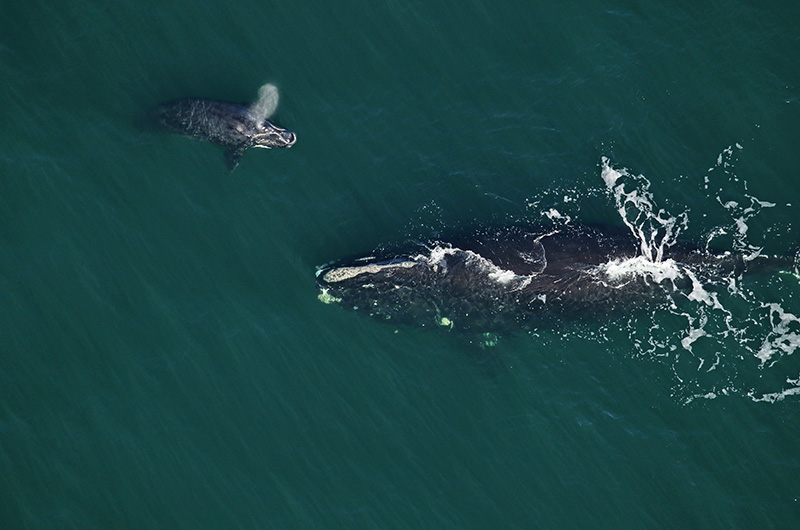Marking a major shift in the tide for the critically endangered North Atlantic right whale, a federal judge has ruled that the government agency charged with protecting the near-extinct marine mammals violated the Endangered Species Act by not appropriately assessing the impact of the lobster industry on right whales in 2014.
In a 20-page ruling issued April 9, the Hon. James E. Boasberg of the U.S. District Court said when the National Marine Fisheries Service prepared a biological opinion for right whales that found the lobster fishery did not jeopardize their continued existence — despite numbers that showed otherwise — the opinion failed to include an incidental take statement, as required under the 1973 Endangered Species Act.
Right whales were one of the first species to be protected under the federal act. Today their population has dwindled to 400, with fewer than 100 breeding females left.
Incidental take statements quantify the number of endangered species that die incidentally as a result of certain fishing industries.
The NMFS had previously determined that the lobster industry take for right whales was approximately three animals annually. But because the maximum allowable take to sustain the species was less than one whale per year, the NMFS decided not to issue a take statement at all in its 2014 biological opinion.
Conservation groups went to court seeking to invalidate the decision that allowed the lobster industry to continue to do business as usual.
On Friday, Judge Boasberg sided with the plaintiffs, who include the Center for Biological Diversity and the Humane Society of the United States. The Massachusetts and Maine lobstermen’s associations later intervened on the side of the defendant, the U.S. Secretary of Commerce.
“The [NMFS’s] failure to include an incidental take statement in its 2014 biological opinion after finding that the American lobster fishery had the potential to harm the North Atlantic right whale at more than three times the sustainable rate is about as straightforward a violation of the ESA as they come,” the judge wrote in part. “The court therefore declares the 2014 biological opinion to be invalid under the Endangered Species Act and will order briefing from the parties on the issue of an injunctive remedy.”
At the outset of the memorandum the judge wrote:
“The largest modern threats to this species are ship strikes and fishing-gear entanglement, each of which also makes the whales more susceptible to the other.”
The ruling has no immediate impact on the lobster industry, but invalidates the NMFS’s 2014 biological opinion. The agency has been working on a new opinion since 2017.
Erica Fuller, an attorney with the Conservation Law Foundation, which joined the case later, said the timing of the decision was important, since the NMFS is currently at work on new regulations.
“We are pleased to get the decision, and we are really pleased to get the decision while NMFS is working on its new proposed rule,” she said. “They told us we are going to see something by late summer or early fall. So it is nice to have this decision so that they can do the next biological opinion legally.”
Since 2017, more than 30 right whales have died from anthropogenic (human) causes, including vessel strikes and fishing gear entanglements. A severely emaciated breeding right whale female named Dragon was spotted south of Nantucket in late February, showing signs of gear entanglement. Ms. Fuller said no significant right whale regulations have been instituted since 2015, when the NMFS designated additional critical habitat for the species in the Gulf of Maine. She said she hoped the decision would spur additional regulatory work.
“They haven’t really done anything on the water since 2015 to protect right whales,” Ms. Fuller said. “So we’re hoping this increases the speed at which NMFS takes some action.”
The next step in the legal process is for conservation groups to provide briefings on their view of an appropriate remedy. Although Ms. Fuller declined to comment on details in the briefings being drafted, conservation groups in the past have advocated for better whale monitoring, improved gear markings, and seasonal fishing closures south of Martha’s Vineyard and Nantucket.
She said any closures would include protected areas in which fishermen are required to remove gill net and trap pot fishing gear should agencies detect whales in the region. Ms. Fuller also said she understood this was a difficult time for the fishing industry during the pandemic.
“Our suit is against the agency and not against fishermen or the lobster fishery,” Ms. Fuller said. “I know they are hurting very badly right now. But we have a problem here. We have entangled right whales, and an agency that is not doing enough. And we need to try to figure out a path forward.”
She said she hoped fishermen would join the effort.
“A future solution depends on working collaboratively with fishermen,” Ms. Fuller said. “I don’t think a court coming down with a hammer is going to find us a long-term solution.”








Comments
Comment policy »